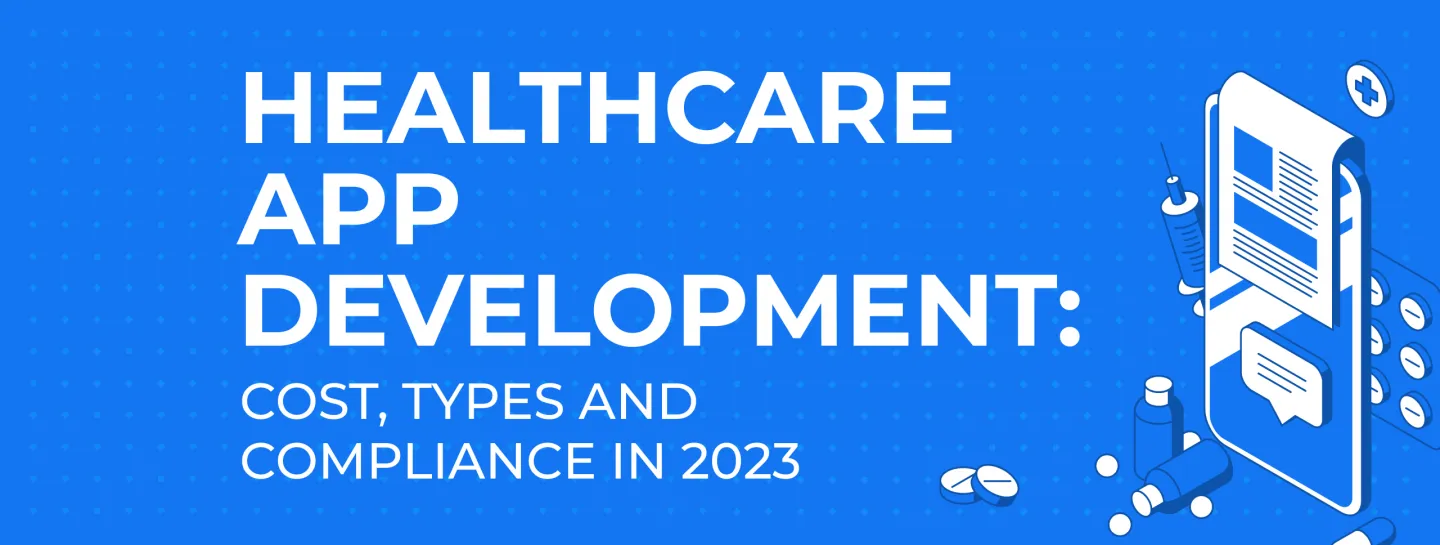
Healthcare App Development in 2023: The Ultimate Guide

Table of contents
- What is Healthcare App Development
- What is the Difference Between a Healthcare App and a Medical App
- mHealth Market Overview
- Types of Healthcare Apps
- Use Cases for a Healthcare App
- Top 5 Successful Healthcare Apps
- Healthcare App Trends
- Benefits of Healthcare Apps For Doctors And Patients
- Monetization Models for a Healthcare Application
- Healthcare App Development Process Step-By-Step
- Industry Standards and Compliance to Consider Before You Start Building
- Why Healthcare Startups Fail
- How Much Does It Cost to Develop a Healthcare App?
- How to Choose a Decent Healthcare App Development Company
- Cost estimation at Magora and Case Studies
- FAQ
- Conclusion
What is Healthcare App Development
In view of the increased interest in health issues, it is entirely rational that over the past few years there has been huge progress in the healthcare industry, which still has large investments for further innovative technology implementation. Human health is the subject of constant research and development, as we all want to stay in very good health and live longer lives.
Healthcare app development is a process that includes mobile and web app building, which is then used to increase efficiency, enhance communication, reduce costs, and upgrade the quality of healthcare services. It is more challenging and complex than in other sectors, as certain rules and restrictions must be strictly followed. If considered in detail, healthcare software and apps improve patients’ physical and mental healthcare and facilitate access to their health issues. On the other hand, such apps help medical staff cope with huge amounts of data, benefit from it, and also monitor a patient’s condition in real time. Appointment scheduling in apps saves time for both sides. Moreover, thanks to online chats, users are able to be in touch with healthcare professionals round-the-clock. Consequently, there are several types of digital healthcare and medical apps on the market, depending on their main features and goals.
What is the Difference Between a Healthcare App and a Medical App
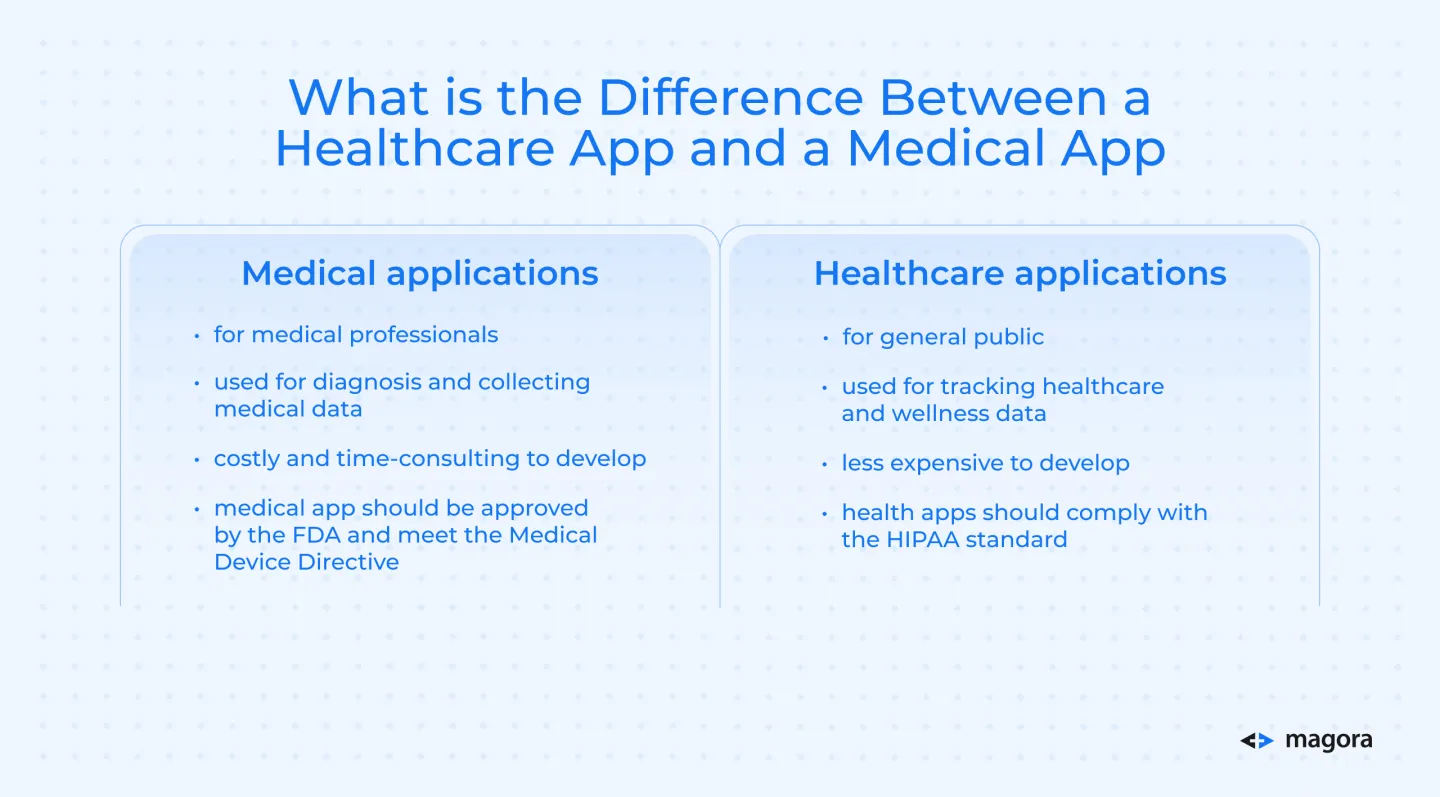
At first glance, it seems that a health app and a medical app are the same. However, there is a substantial difference between these two lies in their primary goal and the audience they are used by.
Healthcare apps provide health-related services for a wide range of non-professional users who want to learn more about their daily health indicators and improve well-being. Meanwhile, medical applications (mHealth apps) are focused on healthcare professionals and work mostly with diagnosing and treatment using collected data analytics. The second difference resides in the restrictions. Health apps should comply with the HIPAA standard, which protects all personally identifiable data from fraud and theft as well as from any use without consent. As for mHealth apps, here the restrictions are more severe and tangible. An app should be approved by the FDA (Food and Drug Administration) and meet the Medical Device Directive. As a result, the development process of a mHealth app is typically time-consuming and costs more in comparison with healthcare app development.
mHealth Market Overview
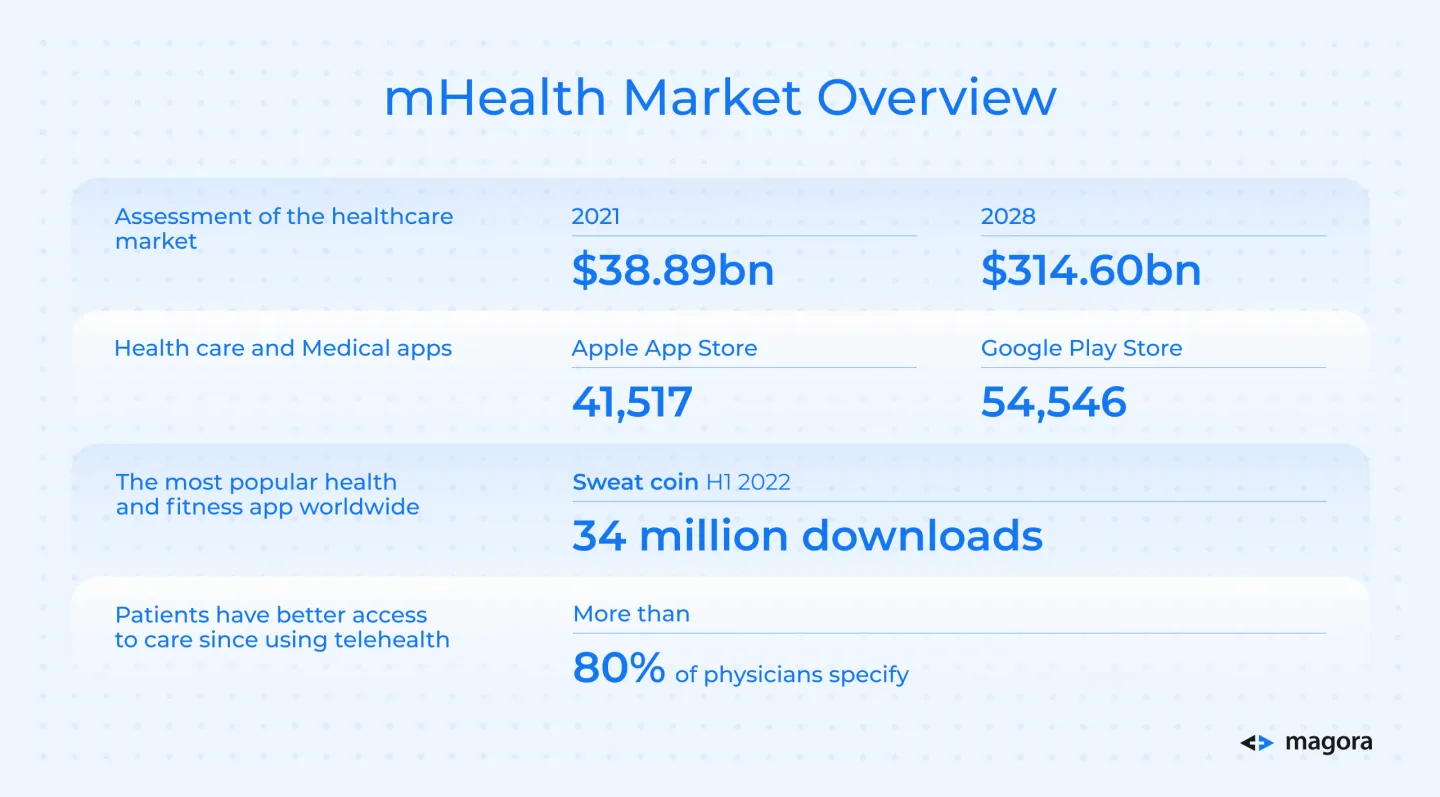
Over the last few years, there has been a clear trend in the sustainable growth of health consciousness. People focus more on the nutritional value of products and take care of how often they engage in physical activities. Thanks to the advanced technologies that keep pace, we can now take our health into our own hands. Due to COVID-19, the world has moved to a new level of care delivery—more targeted and data-driven. Now more than 60% of consumers want to be capable of scheduling appointments, checking test results, and having an up-to-date medication list.
Let us now give some comparable statistics, as the figures speak for themselves.
- The healthcare market was valued at USD 38.89 billion in 2021 and is expected to expand to USD 314.60 billion in 2028 at a compound annual growth rate (CAGR) of 34.8% in the 2021–2028 period.
- There are approximately 41,517 healthcare and medical apps on the Apple App Store.
- A little more you will find on the Google Play Store: 54,546 healthcare and medical apps are available.
- The most popular health and fitness app worldwide in H1 2022, Sweatcoin, had 34 million downloads.
- More than 80% of physicians specify that patients have better access to care since using telehealth.
In the coming years, we will be watching the healthcare app market boom thanks to health-conscious consumers, preventive medicine, and increasing investments in mHealth startups.
Types of Healthcare Apps
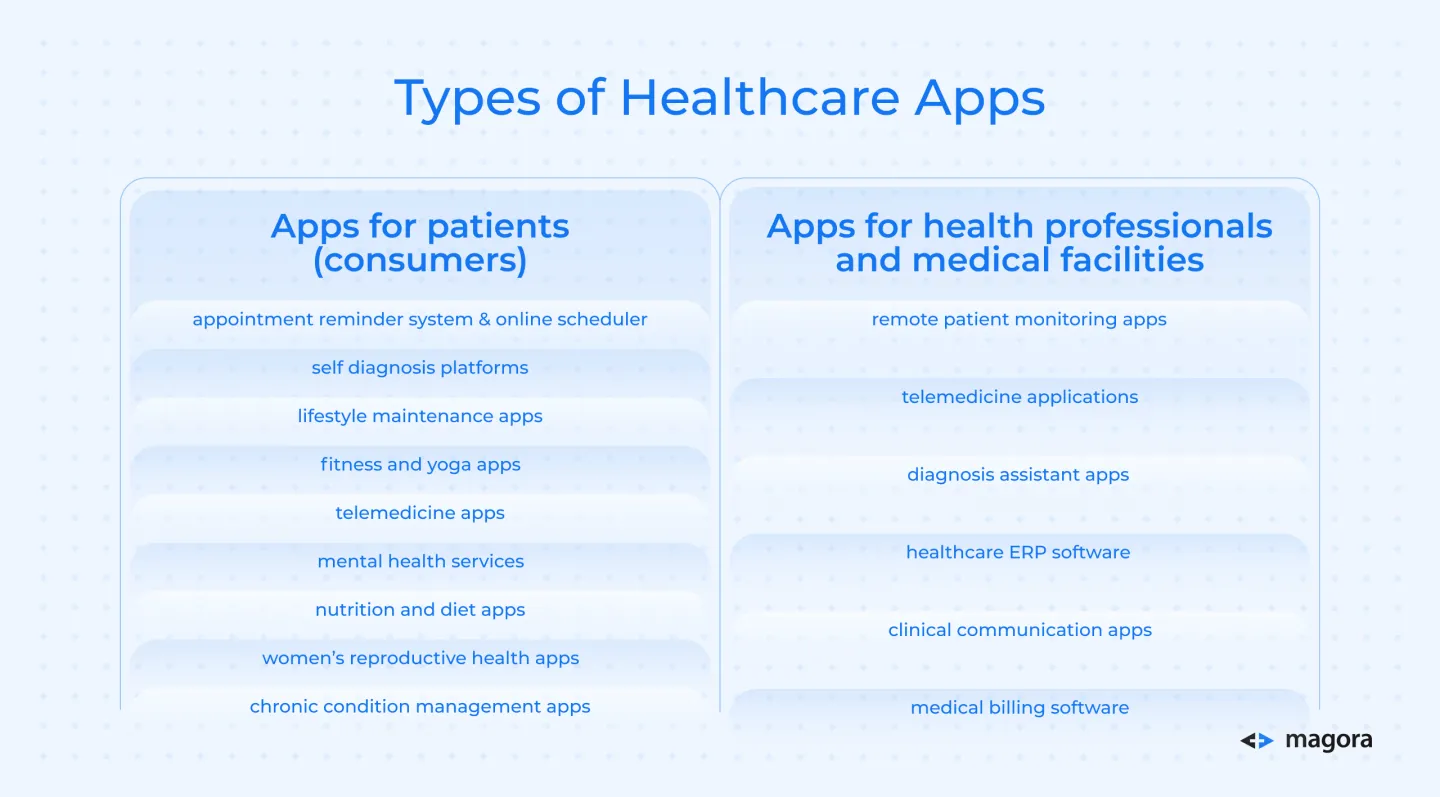
As we mentioned earlier, there are roughly 95,000–100,000 apps available for download today. In order to become a part of the market, it is necessary to determine the app type and its main purpose, as these characteristics influence the whole development process.
According to the target audience, there are two distinct types of healthcare apps:
- apps for patients (consumers);
- apps for health professionals and medical facilities.
The first category includes such applications as:
- appointment reminder system & online scheduler;
- self diagnosis platforms;
- lifestyle maintenance apps;
- fitness and yoga apps;
- telemedicine apps;
- mental health services;
- nutrition and diet apps;
- women’s reproductive health apps;
- chronic condition management apps.
The applications that are dedicated to healthcare professionals:
- remote patient monitoring apps;
- telemedicine applications;
- diagnosis assistant apps;
- healthcare ERP software;
- clinical communication apps;
- medical billing software.
Use Cases for a Healthcare App
It is great if you are deeply into the idea of the healthcare app and have a solution to the challenges that the healthcare system faces. But, anyway, you’d better learn about healthcare apps’ use cases in order to improve efficiency and stay abreast of healthcare app trends.
Telehealth and Telemedicine
One of the main solutions during the COVID-19 pandemic is still popular because of its convenience. About two-thirds of the survey participants are ready to use telehealth services for common illnesses and follow-up visits. In addition, a major part of physicians provide more comprehensive, quality care using telemedicine services. Thus, telehealth and telemedicine software and app solutions are highly sought-after.
Electronic Health Record (EHR/EMR)
It is a huge improvement over the paperwork. EHR/EMR represents software that allows healthcare providers to manipulate patients’ medical information and store it on a single platform. Moreover, these systems help organize and automate clinical workflows.
Health Information Exchange (HIE)
The HIE solution gives healthcare personnel and patients convenient access and enables secure sharing of patients’ essential medical records in digital form—improving the speed, quality, safety, and cost of healthcare delivery.
Built-in diagnostic systems
The Internet of Things technology and embedded devices serve for real-time data exchange between sensor-equipped smart devices and cloud services, or computer/mobile software. They measure and monitor patients’ health indicators and/or environmental conditions, on the basis of which healthcare professionals prescribe treatment and track changes.
E-prescribing (eRx)
This system saves doctors’ time for administrative routine and instead allows them to spend their energy on important patient needs. E-prescribing is the transfer of a drug prescription directly from your physician to a pharmacy using EHR technology.
Top 5 Successful Healthcare Apps
Here we gathered the list of the apps that have already confirmed their quality and received hundreds or thousands of five-star reviews. There are also startups on the list with great concepts.
VisualDx
It is an extensive visual library that provides clinical diagnostics and decision support to healthcare professionals, thus increasing the accuracy of the diagnosis.
Headspace
Headspace is a digital mental health platform that contains guided meditations that form a life-changing habit of daily mindfulness training.
CareZone
CareZone simplifies managing medication lists, systematizes health information, and provides access to health services from smartphones. For example, it automatically reminds you to refill a prescription.
Aaptiv
It is a guide to the world of fitness and wellness. Video and audio collections are able to help you start running, do yoga or gym exercises, stay calm with meditation, and sleep soundly after bedtime meditation.
Kry
Kry is a telehealth software platform for online video or instant messaging consultations with qualified health professionals via smartphone or tablet.
Healthcare App Trends
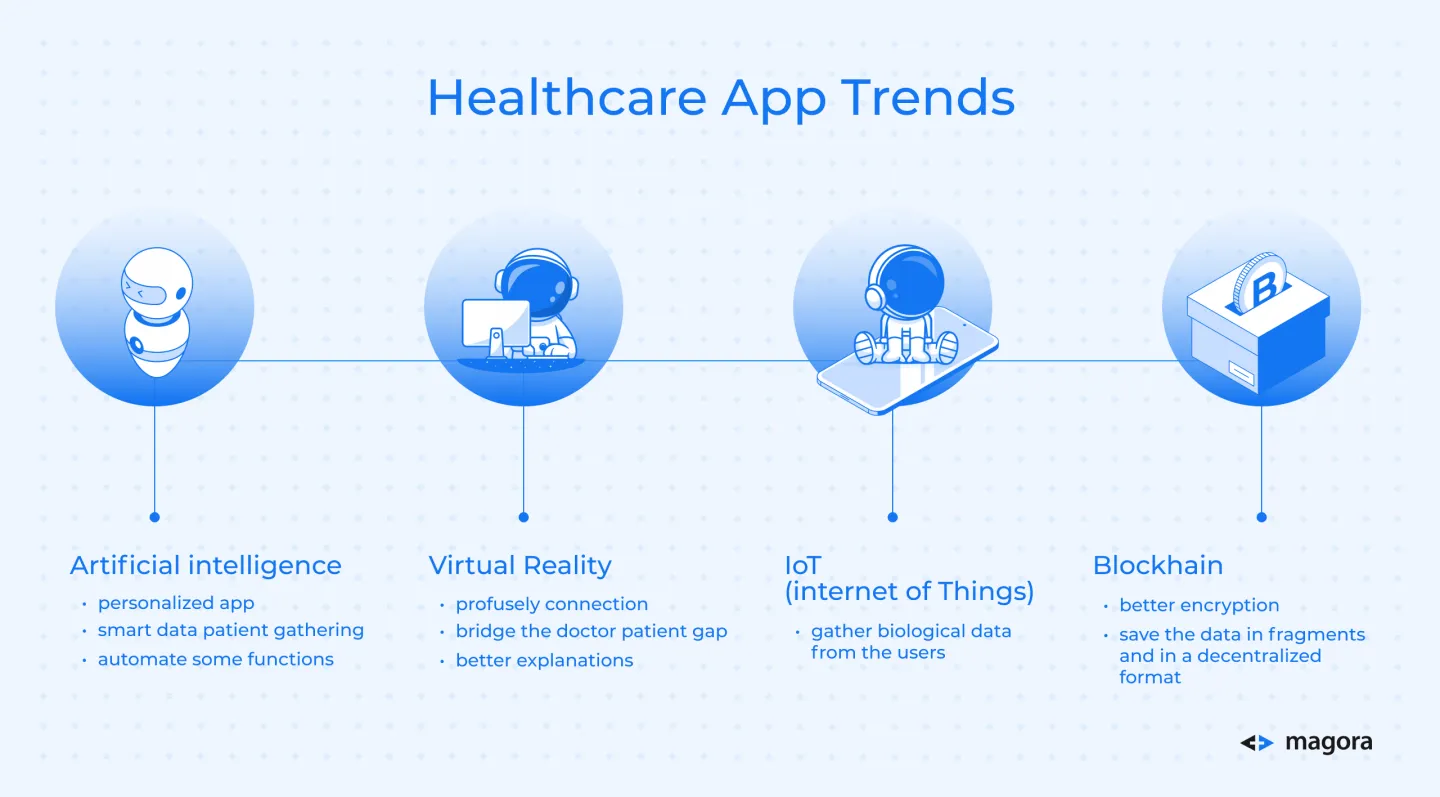
Innovation and advanced technologies boost any sphere of life incredibly. In the healthcare industry, we also see great changes thanks to progress. Further, we will discuss some of the main trends that will help your app stay afloat and be in demand among the audience.
Patient-centered focus
The patients’ experience now is the cornerstone of the healthcare process. Therefore, it is necessary to improve the accessibility and usability of the software and make it customer-friendly so that it can be used easily in emergencies. Moreover, such apps should work smoothly and effectively.
Interoperability
Interoperability in the medical system implements data transmission inside the multiple health networks such as clinics, laboratories, hospitals, and pharmacies. The transfer occurs regardless of the system or software applied and provides safe and fast data exchange. That, in turn, serves to deliver superior care at any time.
Next-Gen solutions
We cannot ignore such cutting-edge technologies as ML, AI, and IoT that strongly influence the healthcare system. There are many cases of their implementation now and this number will only increase. AI technology is good at drug manufacturing and making an early diagnosis. ML analyzes huge datasets and changes them into a human-readable form. The cases in which AI and ML can be used are intelligent chatbots figuring out the patient’s condition, services for checking the pills’ compatibility, or medical image processing to identify the conditions for early intervention.
Benefits of Healthcare Apps For Doctors And Patients
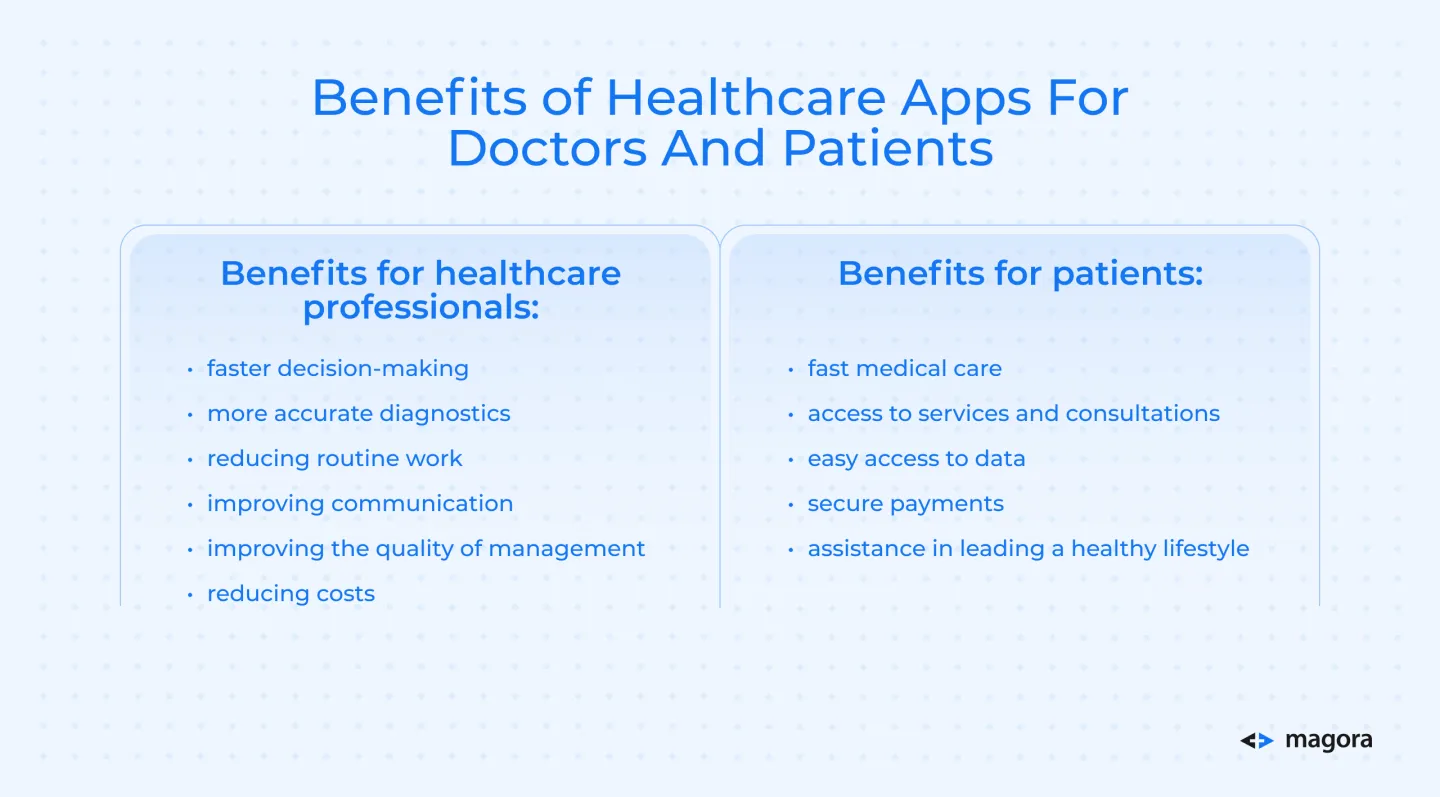
Healthcare application development is definitely a win-win decision for both patients and healthcare providers. In addition, it gives a boost to the whole healthcare system. The benefits for doctors and patients are given below.
Benefits for healthcare professionals:
- speeding up decision-making;
- providing more accurate diagnostics;
- reduction of routine work and workload. As a consequence, there is less professional burnout.
- better communication between patients and doctors as well as between staff;
- management quality improvement;
- spending reductions on healthcare services.
Benefits for patients:
- receiving fast and qualified medical care;
- round-the-clock remote consultations and other medical services available;
- easy access to health data;
- secure payments;
- help in leading a healthy lifestyle.
Monetization Models for a Healthcare Application
In order to build a consistent business strategy, you should think of a monetization of a healthcare app from the get-go. It surely depends on the type of app you create. Here are some of the options appropriate for different situations.
Subscription or freemium models
It is one of the most common methods of monetization when the whole app (subscription) or some of the features (freemium) are available only after a regular (weekly, monthly, or yearly) subscription fee payment.
In-app advertising
Your app is free but has integrated ads. Be careful with this option, as it can be very annoying for your customers. Moreover, you should spend extra time on advertising management.
Sponsorship
Your app is free to download. The revenue comes from the companies that your app cooperates with. This means that the app involves the use of certain equipment or other products.
Pay Per Download/Paid app
Users download the app once they make a payment.
Healthcare App Development Process Step-By-Step
There are the basic steps in the app architecture process. We already talked about the development life cycle, and in this article, we will go through the peculiarities of how to develop a healthcare app.
Step #1: The discovery phase
It cannot be overstated just how important the discovery phase can be for the successful healthcare app development process. At a time when the market is rich for successful healthcare apps, it is critical to find your niche and be sure that there is a demand for your idea. Ask yourself if your app solves certain problems, facilitates lives, and has advantages over competitors. An in-depth analysis that we offer during the discovery phase will prepare the ground for future steps and mark the optimal entry points to the market. An essential part of this step is to determine your target audience, as the audience definitely determines whether your app will become successful. As a result, you need to study your potential customers inside and out.
Step #2: Industry compliance check
Devote your time to healthcare regulation issues; otherwise, this step may go on for a long time.
Step #3: An MVP development
An MVP (Minimum Viable Product) is the simplest operational version with the core features that will help you assess the relevance of your idea with the minimum amount of time and expense.
Step #4: Client testimonials
Collect and analyze users’ reviews. Make all necessary improvements and prepare to launch a final version.
Step #5: Release and maintenance
Now your product is available on the market. You should do regular system updates and think over the next steps of the business expansion.
Industry Standards and Compliance to Consider Before You Start Building
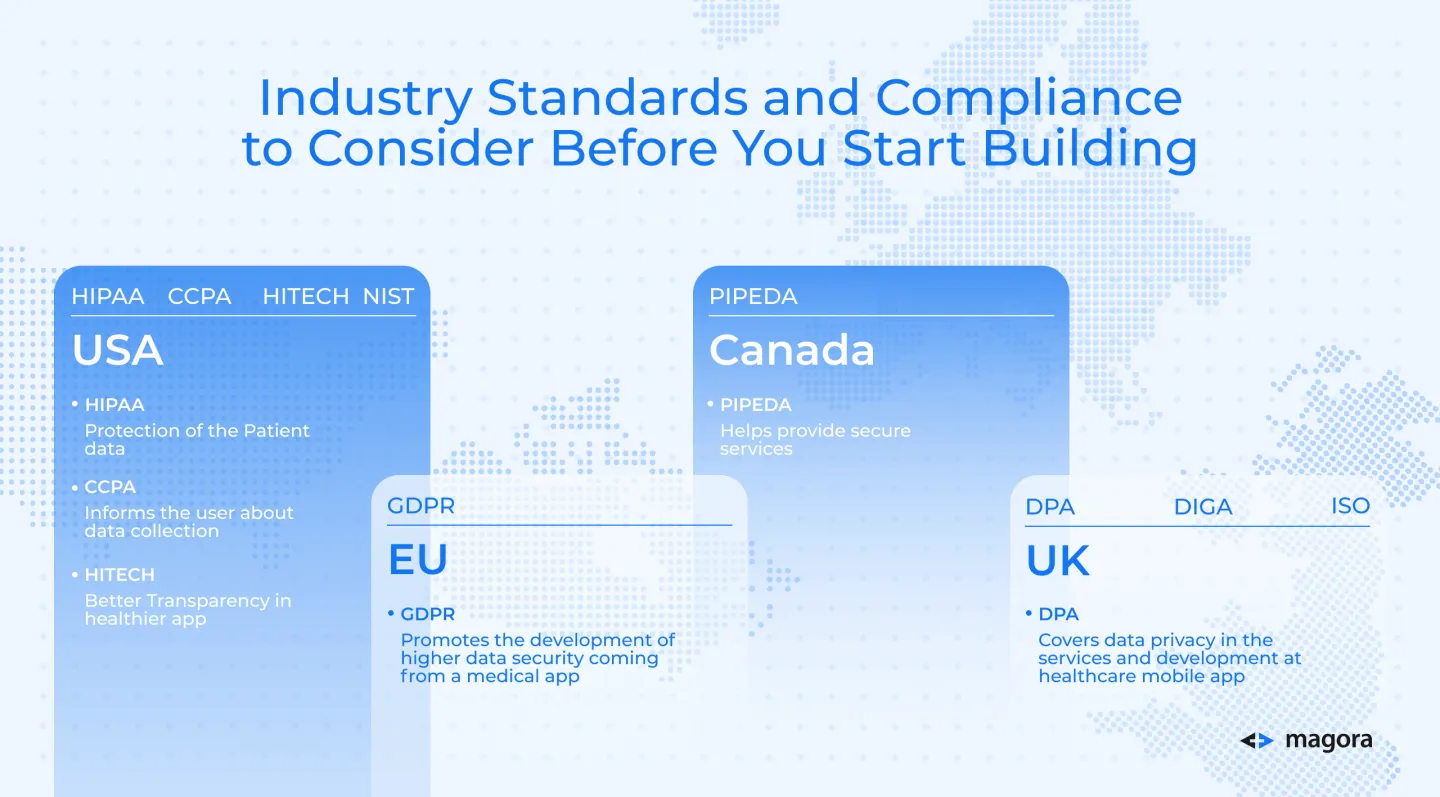
Even before the start of the development process, you should thoroughly study all necessary industry regulations, as they may strongly influence the procedure and not let the app come to fruition. Furthermore, the regulations are different according to the country you work in.
The US
HIPAA
It was enacted in 1996 with the aim of protecting patients’ data and privacy (Protected Healthcare Information) gathered and stored on the apps released in the US.
HITECH
The regulation controls the data security of EHR systems. The HITECH Act extends and strengthens HIPAA. One of the main purposes of the HITECH Act was to foster the integration of electronic health and medical records by creating financial incentives to make the transition from paper to digital records.
NIST
It is a framework that embraces several tools, standards, and technologies. NIST is considered a must-have cybersecurity practice that builds a strong foundation with superior and unbiased work.
CCPA
The standard is the equivalent of GDPR in the EU and is also aimed at preserving a client’s personal data.
Canada
PIPEDA
The Canadian counterpart of the EU’s GDPR is at the federal level. There are also several standards at the local authority level.
The EU
GDPR
GDPR was adopted in 2016, and from 2018, EU companies that collect and store personal information must comply with it.
The UK
DPA
The Data Protection Act 2018 controls patients’ data usage by companies and the government and also protects the right to ask for information about yourself.
Why Healthcare Startups Fail
We want you to create a successful healthcare app that will take off like a rocket and benefit the healthcare sector. And certainly, it will achieve ROI in a short period of time. You should carefully analyze possible vulnerabilities so as not to trip over them during your development route.
Ignorance of industry standards
As aforementioned, complying with healthcare standards is a must, and it takes time and certain skills to study all information. In addition, the rules are constantly reviewed, so you need to keep a pulse on them. Magora is ready to lend a helping hand, as we have extensive experience easily navigating among the legal papers.
API Security Vulnerabilities
Application programming interfaces (APIs) are a number of functions and procedures enabling communication between applications and data sharing. The study held in 2021 revealed 100% API vulnerabilities in 30 popular mHealth apps. Though it is challenging, at Magora, we know how to build reliable walls to protect all data from hacker attacks.
Here are some other cases to avoid:
- Poor-quality UX design entails a lack of accessibility.
- Lack of overall awareness of healthcare needs and disregard for their opinion during the app’s development.
- The shortcomings of the concept and the idea.
How Much Does It Cost to Develop a Healthcare App?
For a start, the reference point we will draw on is the complexity of your future healthcare app. The more capacity the project includes, the higher the costs will be. For example, to create an online chat between physicians and clients, approximately 120 hours are needed. With an average rate of $50/hour, the feature will cost $6,000.
The app concept also influences the development team composition. If you need (and we strongly recommend) to do market research, analyze competitors, and think of strategies to mitigate risks, you would better include the discovery phase and attract business analysts into the team.
We are quite often asked how much does it cost to design an app? Every case is unique, nevertheless below are presented more factors that affect pricing:
- the latest technologies implemented, such as IoT integration, AR/VR services, or blockchain secure payment, make the cost go up;
- the platform to work on (iOS, Android, cross-platform);
- application design (animations, custom interface);
- software development team hiring options (in-house, freelancers, or an outsourcing development company);
- location of the development team. The price differs according to the region and is appropriate valued at:
- the USA: $150/h;
- the UK: $140/h;
- Eastern Europe: $70/h;
- India: $30/h.
How to Choose a Decent Healthcare App Development Company
In order to choose the right healthcare app development company among the others, and be satisfied with the end result, it is a good idea to mark the bullet points and later eliminate the inappropriate companies.
1. Check the company’s expertise in healthcare projects. This could be a case of previous projects such as electronic medical records, healthcare CRM software, remote patient monitoring apps, patient engagement systems, and so on. Learn about the solutions the company offers.
2. Take a look at its portfolio; it should draw your attention and reflect the company’s experience.
3. Search for the real reviews and ratings on famous platforms (e.g., Selected Firms).
4. Healthcare software development companies must adhere to industry standards like HIPAA, HIS, PHI, PII, and GDPR and be aware of local government compliance rules.
5. Be sure that the company’s development process and approach suit your expectations. Discuss the whole process step-by-step, and don't be afraid to propose something new if you have fresh ideas for healthcare app.
6. Choose the company that will suit your budget. Negotiate all expenses beforehand.
7. The company should provide the agreements confirming standard cooperation models.
8. It is worth paying attention to post-launch maintenance and further optimization.
Cost estimation at Magora and Case Studies
Working with us, you have a detailed cost estimation plan with the possible variants of cutting spending on hand. In the initial phase of the development process, we will figure out the working hours needed. Go over third-party integrations and their benefits for the project; think over the mandatory standards for the healthcare industry. Our experts highlight the key industry peculiarities that may affect the total cost and advise on how to manage risks that can surprisingly double your expenses. We have a broad experience base that we can draw on in order to be accurate in our calculations.
Speaking about our previous healthcare projects, we cannot fail to refer to our medical costs calculator, Innovocare; remedy database, Doctor OTC; or virtual fitness trainer, WellCaster. Challenging tasks inspire and energize our team to come up with the best solutions for your software. We are happy to be a part of a great app like Cognitive Trainer that helps people stay healthy. The client’s request was to create a depression-fighting web tool on the basis of cognitive behavioral therapy. Technologies such as jQuery, CSS3, HTML5, and others were implemented to achieve strong privacy levels for personal data and add custom elements.
FAQ
Do all healthcare apps comply with legal regulations?
If a healthcare app deals with sensitive data (e.g., date of birth), then it must comply with the regulations. Legal or advisory guidelines for each region of the world are similar but still have some variations. And they should be learned carefully before the development process.
What are the reasons for healthcare startups to fail?
Every case should be analyzed individually, but some of the main reasons for that could be the following:
- ignorance of industry standards;
- security vulnerabilities;
- lack of understanding of the healthcare industry;
- problems with the main concept.
Why are healthcare apps important?
Healthcare apps facilitate interaction between physicians and patients, shift focus towards patient-oriented care, give quick and easy access to the essential data, speed up decision-making, and reduce the number of mistakes. Apps may also significantly cut costs for the whole healthcare system.
Conclusion
The healthcare app market is more competitive than others. The development process may be even more time-consuming in comparison to other industries. However, smooth cooperation with the Magora company will transform your idea into a unique product and make it reliable, secure, and marketable with minimal time and money expenses. We offer to help you develop your digital product with us. Click the button and let us prepare a unique plan for your dream’s realization.





